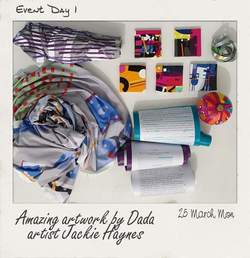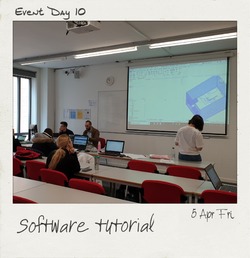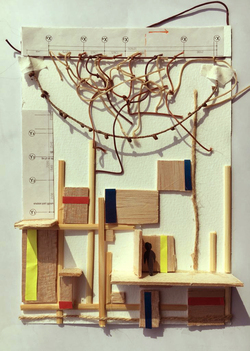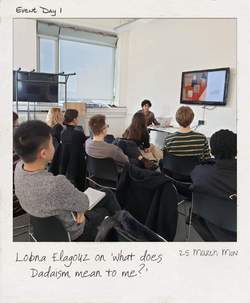Day 10 Software Skill Session and Voice Over Recording
Wrapping up the event weeks, we have done software skill tutorial and answering questions on BA students' design project and portfolio work this morning. Saad, who is working part time in an architectural firm, gave a tutorial on Revit. This afternoon, we will be doing voice over for the movie with the script we wrote up yesterday and another softeware skill session on Illustrator and Rhinoceros. We are also doing the selection of images that best describe the hectic yet rewarding two weeks!
Posted 5 Apr 2019 13:51

"Countryside is Great"
In the The End of Urbansim Symposium 2017, there was a presentation on Hyper-rural: Rethinking Space.
In the archive article of the presentation, it talked
about rural area as a new tourist place to visit in opposite to the city and it raised the issue of place-making in the rural area and how that led to the management of rural tourism. The management of rural tourism then entails another discussion on arts in the rural area, the spectatorship and passivity approach are discouraging the artists' experience and creative vision. Key words of action such as “understand”, “share”, “make connections”, “communicate”, “knit together”, “define”, “reconnect”, “record”, “protect” and “promote” are useful in the discussion and they are use in the Arts Council England policy document Arts in the protected landscape (Arts Council England, 2008) to explore how to record and interpret art. Please click in the link below for the article.
http://ruralrecreation.org.uk/hyper-rural-rethinking-place/?fbclid=IwAR3Ngu8U630oQuf2W1_L-m05Harm8pv16syzLbbO35N8N5ueuF2khMNj2zgPosted 4 Apr 2019 14:46

"TATE BRITAIN EXHIBITION: SCHWITTERS IN BRITAIN"
Schwitters in Britain is the first major exhibition to examine the late work of Kurt Schwitters, one of the major artists of European
Modernism. The exhibition focuses on his British period, from his arrival in Britain as a refugee in 1940 until his death in Cumbria in 1948. Schwitters was forced to flee Germany when his work was condemned as ‘degenerate’ by Germany’s Nazi government and the show traces the impact of exile on his work. It includes over 150 collages, assemblages and sculptures many shown in the UK for the first time in over 30 years.
Schwitters was a significant figure in European Dadaism who invented the concept of Merz – ‘the combination, for artistic purposes of all conceivable materials'. Whether those materials were string, cotton wool or a pram wheel, Schwitters considered them to be equal with paint. He is best known for his pioneering use of found objects and everyday materials in abstract collage, installation, poetry and performance. Schwitters’s time in Britain was quite extraordinary and continues to reverberate today, with the influence he has exerted over artists such as Richard Hamilton, Eduardo Paolozzi and Damien Hirst.
Please click the link below for the information of the exhibition and a video about Merz barn.
https://www.tate.org.uk/whats-on/tate-britain/exhibition/schwitters-britain?fbclid=IwAR2Ka1d3ZH--6smWyL3jayT6T1jWW9qP-cceUI84NJQWO1YbjJ8Z8OiTXB8Posted 4 Apr 2019 11:37
Day 9 Preparing for the premiere tomorrow!
Today we continue working on editing the movie. After the preview yesterday, we had a discussion on the clips: on the speed, the sound effect and we decided to have some rearrangement on the movie so it flows smoothly. Therefore, we are working on the revision of the movie clip from yesterday and are continuing to add more footage into the movie. We are also working on the script for the voice over to give information on the findings we have got during the 2 weeks event.
On the other hand, our master students team also answer questions raised by the bachelor students on software usage, design project and portfolio as we reckon skills sharing is also a key element during the Event weeks.
Posted 4 Apr 2019 11:30
"OMA Lecture: Countryside"
In 2012, Rem Koolhaas gave a lecture on "Countryside" in Stedelijk Museum Amsterdam where he presented his manifesto on the countryside. In fact, during
our trip to Merz Barn we were told by Ian, our collaborator from Littoral Trust that Koolhaas made calls to the Merz Barn and expressed his interest in designing a museum in the barn site. And in few years, there will be a museum dedicated to Kurt Schwitters and other refugees artists and architects that fled to the UK and the US and how they played a role in the modernism of art and architecture.
Rem Koolhaas has kept his thoughts and photos of rural issue throughout the years on a blog on the OMA website, which through the blog we can have a glimpse of the architect's notions on the importance of the issue. Please click in the link below for the blog.
https://oma.eu/lectures/countryside?fbclid=IwAR3_qNvuJNEN4jVMUhlXt2HrkFIk9A0XZvaNNhe2U8SbXA5Aa5Lh9ZUy8qYPosted 4 Apr 2019 10:55
"Urban vs Rural"
Our team member, Lucy has shared with us an insightful article on BBC news about urban versus rural.
It begins with a book on the life and work of Samuel Palmer,
a romantic artist and how it opened up the discussion on the contrast between urban and rural lives. It then jumps on to some interesting statistics on people living in urban and rural area. Did you know that people living in urban tend to have a shorter life span by 2 years than people living in the rural? Did you know the proportion of the population living below the poverty threshold is 18% in the country and 23% in towns?
It's an interesting article that we can have a good discussion about. To view the article, please click the link below.
https://www.bbc.co.uk/news/uk-13617401?fbclid=IwAR0aWL2WfCzLyhdNMmWInZykmPhfNpcFcLFf0dd3b8YH1dSAVasOIcBzTZAPosted 3 Apr 2019 11:32
Event Day 8 Film Editing
This morning we continue to editing the videos — and we are combining them to be ONE MOVIE PRODUCTION! Yesterday we had a heated discussion on how we could produce a movie that is aesthetic, informative and interesting to watch and we came up with some brilliant ideas. So today we are working together as a whole team, with a big screen displaying the video editing process and everyone can comment instantly. We are also doing some further research on ruralism and hopefully we would be able to deliver those information through our movie production!
Posted 3 Apr 2019 11:07
Day 7 Video Collaging
After we did some shooting in Manchester and Lake District and collected footage of city, rural and the Merz Barn, we have started editing the videos. We started the day with skills sharing session on video editing software and have made some short clips. We have explored video collaging, overlapping clips we took in the Lake District on city landscape. The white noises come along with the video are also used to accentuate the city and rural lives. The artistic collage we did on the previous day was a useful exercise for today as it helped us to think creatively and to test the materiality.
In the afternoon, we had a review session on the video clips we made. Comments and advice were given on each clip for further improvement. We will continue the editing process tomorrow as a whole team.
Posted 3 Apr 2019 10:53
Day 6 - Collage manifesto
"The collage composed of sticks and wood pieces organised in grids and lines manner is inspired by Piet Mondrian work. Colour strips are added on the wood pieces to show the vibrancy of city life. The De Stijl style represents the city composition reduced to form and colours, it also looks like the scaffolding for construction. The grid from an architectural drawing is used in the collage to show order and scale. The strings are the wires overhanging in the city. It's a collage of Dadaism crossovers De Stijl style: the organic, spontaneously form clashing with the structured and proportional art style." -Ethel Ng
Posted 2 Apr 2019 11:00
Day 3 Filming in the city
We are all ready and excited to head to Lake District tomorrow! We had the storyboarding workshop yesterday and came up with some creative filming ideas! We are going to do some filming in Manchester city today to get ourselves familiar with the equipment and practice filming techniques. We are all looking forward to immersing ourselves in the atmospheric UNESCO site of Lake District!
Posted 27 Mar 2019 11:06

Day 1 Ruralism talk, Eddy Fox
Eddy Fox, programme leader for landscape architecture in MSA, gave us an inspiring talk on ruralism. There is a perceptual distinction between city and country side. The urban-rural dichotomy demonstrates how city has always been perceived to be superior over rural. The rural is considered to be ‘wild, dangerous and irrational’ compare to cities. In UK, the enclosure movement segregated the common rural area into privatized fields which made it even more difficult to unify or rationalize. The Garden City Movement, the Eixample and other philosophies from John Ruskin, William Morris and Cedric Price aimed to break down this dichotomy by integrating the advantages of the rural with urban development.
Eddy went on to describe the challenges in Lake District, including flooding, overgrazing, ageing communities and ecological impacts. In particular, the economic model in Lake District is unsustainable; the grazing industry is declining even with subsidies and the locals are having very low income. House prices are rising and becomes unaffordable to them. As Lake District had been listed as UNESCO world heritage, the future plan will need to balance the conservation of nature and the development of new economies and technologies such as renewables to revive the area.
Posted 26 Mar 2019 10:45

Day 1 Dada talk,Jackie Haynes
Dada artist Jackie Haynes brought her amazing artwork to share with all of us and gave us some creative ideas on how to create Dada art. She’s currently doing a PhD researching into Kurt Schwitters’ life and she has examined thoroughly into the tangible relationship between the digital and materialism in artworks that challenges assumptions.
Jackie also believes in reusing and repurposing artwork to give them a second life after the exhibitions. The idea she has about moving artworks around in some sense runs parallel to the idea of Dadaism and goes into the nomadic entity party of Schwitters’ research. Lastly, regarding the histories of Dadaism, she has talked extensively about the missing voices of the art period – the women that gets written out of art histories and her work tries to bring light to the missing links to the table. Mina Loy is a important figure in the dada art movement that does not get enough recognition for her work done within Dadaism and Jackie sets out to incorporate Loy’s work within hers to let more people know about the missing voices of Dadaism.
Posted 25 Mar 2019 18:54
Day 1 Dada talk, Lobna Elagouz
Lobna Elagouz also shared to all of us today what does Dadaism mean to her, how it inspires her studio project and gave us tips on how to film on the Merz barn site!
Posted 25 Mar 2019 18:48
Day 1 Dada talk, Dominic Sagar
Day 1 of our event week began with Dominic Sagar enlightened us on 'What is Dadaism?' with lots of inspiring images!
Dadasm is from the ‘madness’ after WWI. Intellectuals fled to the US bringing with them modernist ideas. Kurt Schwitters proposed his own vision of ‘MERZ’, taken from the bank ‘Commerz’, through collages and Merz barns he work on in Germany, Norway and UK. He distinguished himself from political aspect of dada.
Posted 25 Mar 2019 11:55
Session plan
Hi guys! Take a look at our event weeks activities which include 3D sculptural workshop and field trip to the Lake District! We cant wait to meet our team!
Posted 26 Jan 2019 13:18
Conceptual stage
The beautiful Lake District is an ideal place for us to embark on an adventure on rural issue! With the breathtaking scenery of one of the UNESCO World Heritage Sites in front of the eyes, the event group will have a deep understanding on rural by immersing oneself into the nature. Merz Barn by Kurt Schwitters in the lake district will inform us the artist's view on ruralism and will be used as an inspiration for the discussion of the matter.
Posted 9 Jan 2019 15:05















